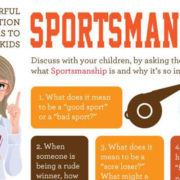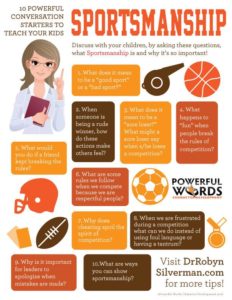
Good Morning America came to my house last night to ask me about a hot button topic discussed this morning on the show.
http://abcnews.go.com/beta/Lifestyle/pittsburgh-steelers-james-harrison-back-sons-participation-trophies/story?id=33130650
 James Harrison, football star on the Pittsburgh Steelers, is one tough linebacker. He also has drawn a hard line when it comes to parenting. On Instagram this past weekend, he reported that his 2 sons received “participation trophies” and that he was returning them.
James Harrison, football star on the Pittsburgh Steelers, is one tough linebacker. He also has drawn a hard line when it comes to parenting. On Instagram this past weekend, he reported that his 2 sons received “participation trophies” and that he was returning them.
“While I am very proud of my boys for everything they do and will encourage them till the day I die, these trophies will be given back until they EARN a real trophy” (photo). “I’m not about to raise two boys to be men by making them believe that they are entitled to something just because they tried their best. Cause sometimes your best is not enough, and that should drive you to want to do better…not cry and whine until somebody gives you something to shut u up and keep you happy.”
Harrison used the hashtag #harrisonfamilyvalues to punctuate his point.
While many agreed with Harrison’s views, some also disagreed. Here’s what I think:
For some children who may have participation challenges due to social skills or shyness issues, a participation trophy can be a tangible way to encourage those children to participate more and celebrate their participation. For most other children, they don’t need participation trophies and can, in fact, learn important social skills and sportsmanship from winning and losing.
As parents and teachers, here are some important tips:
(1) Disconnect the term lose from loser: As parents, we need to help children learn how to be a gracious winner and, just as important, that even when you lose, it doesn’t make you a loser. When a child experiences a loss in competition, it can help to strengthen that child’s character because that child can see that there is always next time– always another chance– always more hard work s/he can put in to learning and growing.
(2) Use a loss as a lesson: Allow your children to lose! Remember, no loss has to beat you down– not in competition and not in life! What can you learn from the loss? How can you get better? What can you do differently next time? This conversation might not happen right away– but once the frustration of the loss dies down a bit, a conversation can be a wonderful way to turn a loss into a win. (See me talk about this more on another segment regarding losing and grit that aired on GMA here)
(3) Share your grit to glory stories: Grit, going after a goal with passion without letting obstacles get in the way, is a vital part of character development. Show your children how grit helped you get through! When did you lose? How did you react? Parents and teachers can share their stories and what they learned from winning and losing. You might be surprised by how inspirational you can be!
Children are all different– and you know them best! The answer to this question regarding participation trophies is NOT about age or development but rather about what your personal child needs to thrive and take a step towards independence. For some, participating in itself is a win. For others, the bar needs to be set higher.
In the end, all people need to learn how to cope when they don’t win and once they do, that’s a win they can take with them for the rest of their lives.




 Sportsmanship, showing respect for the rules, the participants and the spirit of competition, is an important powerful word all kids (and adults) must learn when competing with others. Given that May is Sportsmanship month for Powerful Words Character Development, this is a great time to discuss sportsmanship with your children.
Sportsmanship, showing respect for the rules, the participants and the spirit of competition, is an important powerful word all kids (and adults) must learn when competing with others. Given that May is Sportsmanship month for Powerful Words Character Development, this is a great time to discuss sportsmanship with your children.


 James Harrison, football star on the Pittsburgh Steelers, is one tough linebacker. He also has drawn a hard line when it comes to parenting. On Instagram this past weekend, he reported that his 2 sons received “participation trophies” and that he was returning them.
James Harrison, football star on the Pittsburgh Steelers, is one tough linebacker. He also has drawn a hard line when it comes to parenting. On Instagram this past weekend, he reported that his 2 sons received “participation trophies” and that he was returning them.